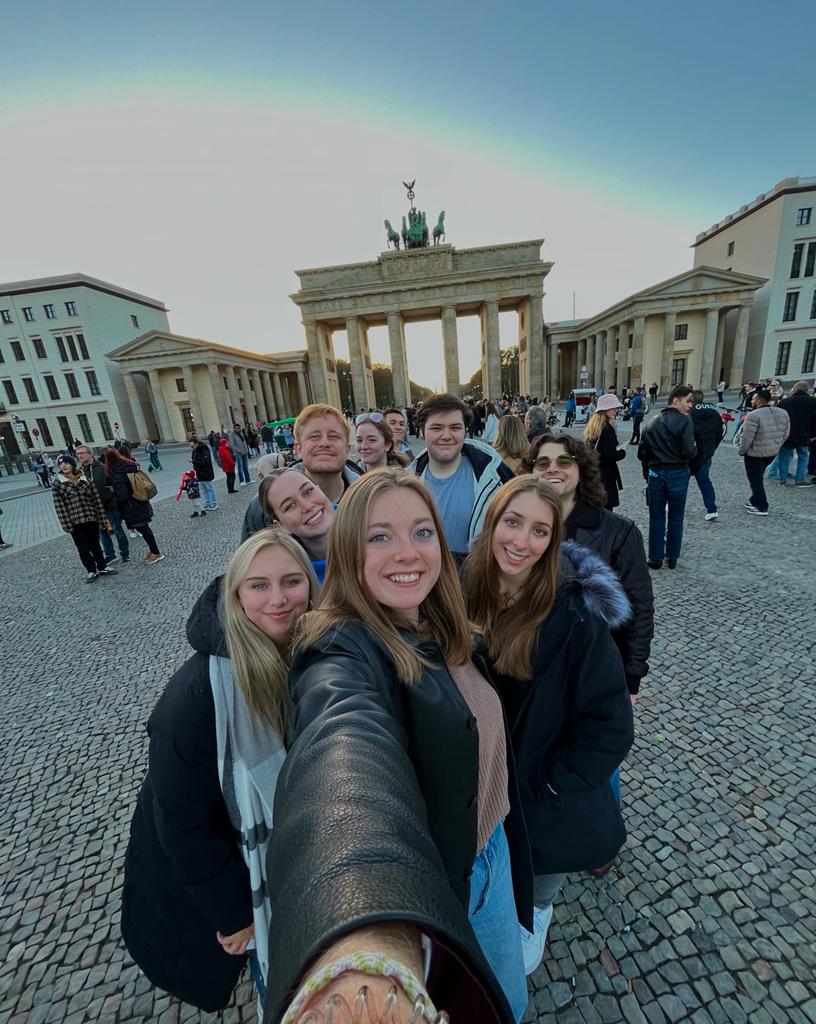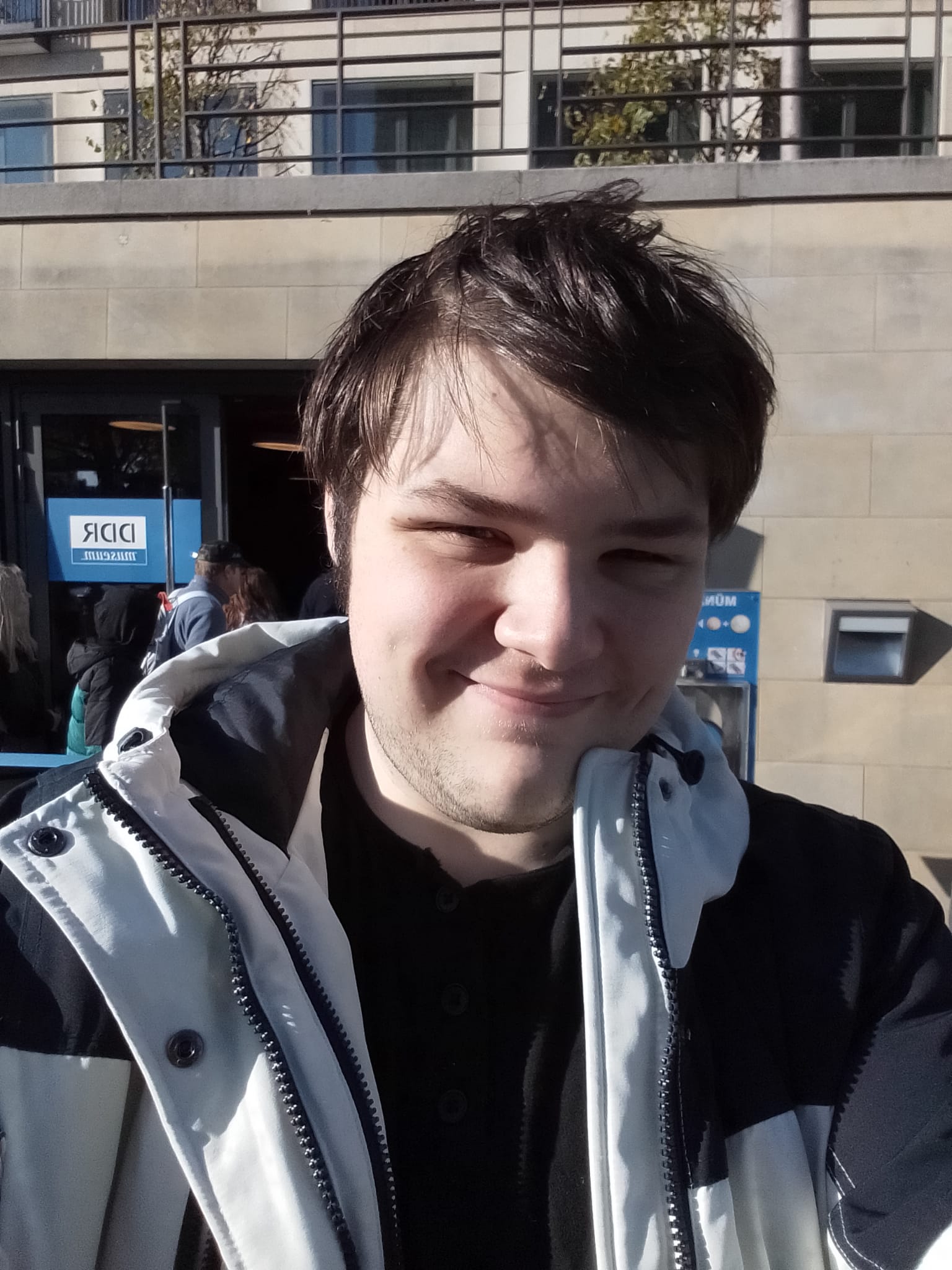Junior Year in Munich students travel to Berlin

JYMers took part in a trip to Berlin from November 4-7, 2022. While all JYMers were invited and encouraged to participate, the trip was tied to two of the courses taught in Winter Semester 22-23, “Deutsche Kulturgeschichte von der Romantik bis zur Gegenwart” and “Die Weimarer Republik in Berlin und München.”
This meant that the organized part of the tour did not focus on the sites one immediately thinks of when traveling to Berlin, but the students saw some of those on their own and we are sure that they will go back for more!
To make the most of our weekend, we took the 6:56 Sprinter-Zug from Munich to Berlin. Everyone had a buddy whom they had to wake up, which got everyone to the Hauptbahnhof on time. The time in the train was then used for breakfast and sleep. One can no longer expect that the trains in Germany run on time, but ours did and we arrived as scheduled at 11:30.
Our first stop was the Generator Hostel in the Storkower-Strasse in Prenzlauer Berg, on the outside a good example of socialist Neubau architecture, on the inside both utilitarian and hip. We had breakfast there and they provided bag lunches for Saturday through Monday. And, of course, the second stop was at a Döner-Imbiss, where one of the JYMers was prodded into showing the appropriate enthusiasm of this Turkish-German sandwich so often associated with Berlin.
The cultural focus of the day was the Weimar Republic. At the Berlinische Galerie in Kreuzberg, we had a tour of the Neue Sachlichkeit collection. Since JYM is right next to the Lenbachhaus in Munich, it was particularly interesting to think about the differences between the pre-WWI Blauer Reiter and the New Objectivity of the 1920s.
With the help of images and videos on the iPads he had with him, historian and actor Arne Krasting guided us through the area around the Zoo train station and helped us to see it as it was in the 1920s: with its traffic, newspaper culture (we are standing in front of Kiosk Yüksel at the corner of Ku-Damm and Uhlandstrasse, which is a protected landmark and dates from the period), dance halls (where you could use a phone at your table to call the attractive person across the room), movie theaters, political clashes and widening divisions between rich and poor.
Afterward, we headed back to Prenzlauer Berg for a pizza dinner at Il Giradischi in the Oderbergerstraße.

On Saturday, the cultural focus switched to East Germany, the focus of one of the units in the culture class.
Our tour guide from Berlin on Bike, Niko, guided us along the path that follows the outline of the Berlin Wall from the Mauer Park in the Bernauer Straße to the Reichstag. JYM bravely pedaled along the path—and sometimes through the streets_ of Berlin. Nico provided insights into the history of the wall and its construction as well as into the lives of Berliners on both sides of the wall. He also provided insider tips to the students on where to go that evening. After the tour, many went to see the Brandenburg Gate and others went to the GDR Museum.
And from there, they headed to the clubs in the currently hip Simon-Dach-Straße.
Sunday got off to a leisurely start, with some of the group sleeping in and others visiting nearby flea markets. We met up for a walking tour of the Kiez or Berlin neighborhood where we were staying, Prenzlauer Berg, whose history of Mietskasernen is similar to that of the tenement housing in NYC.
From there, we headed to the Tadschikische Teestube, which had been built as a 1974 contribution of the Soviet Union to the Leipzig Trade fair and moved twice before it found its current home in the Oranienburger Straße. There, we relaxed on cushions on the floor, nibbled on cookies and crackers, and drank tea served in a Samovar, which one could sweeten with jam, sugar, rum raisins and candied orange and lemon peel.
Our final group adventure of the weekend was a performance of Die Nacht von Lissabon at the Maxim Gorki Theater. The play is based on the novel of the same name by the author of All Quiet on the Western Front, Erich Maria Remarque and tells the story of a German migrant trying to flee National Socialist Germany. The stage adaptation was written by its director, Hakan Savaş Mican and weaves into the original plot stories of 21st-century migration.
We woke up early on Monday to get the train back to Munich, but not as early as we had woken up on Friday. One can’t get to know Berlin in a weekend, any more than one can get to know Munich in a weekend, but it was an enjoyable introduction.